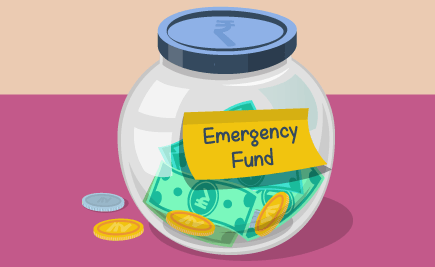Learn: How to Build an Emergency Fund?
Jan 16, 2024 By Triston Martin
Introduction
How to build an emergency fund? If you've set aside money for unexpected expenses, you shouldn't have to resort to using credit cards, taking out high-interest payday loans, or mortgaging your home to make ends meet. When setting up your emergency fund, you should consider all potential expenses, not only the optional ones. Expenses like groceries, medicine, utilities, a roof over your head, car maintenance, car insurance, and gas for your car are all examples of mandatory expenses.
However, there is no universally accepted definition of what exactly defines an obligation. Some people may feel forced to pay for helpers like housekeepers and chauffeurs, while others may feel compelled to keep their gym memberships active regardless of their financial situation. You must put away enough money to cover your necessary costs.
How Can An Emergency Fund Be Created?
You might put off starting an emergency fund because you're worried about coming up with the first sum. Rather than giving up too soon, try some simple strategies to help you save up the money you'll need.
Set A Deadline For Building Your Fund
If you give yourself a deadline, you're more likely to finish the task in the allotted time. A timetable for accomplishing your emergency fund objective should be defined depending on your present financial condition. It might go on for three, six, or even 12 months. The sooner you start, the simpler it will be to attract investors and amass the required capital. Recapitulate your possessions at the moment. It's possible you currently possess some that may be put toward your rainy-day savings. There are several places you could have spare cash lying around, including savings accounts and fixed deposits that aren't earmarked for anything specific. A part of the money can go into an emergency savings account.

Create A Monthly Agreement
To compensate for the gap between your needs and your resources, known as the shortfall, you can withdraw a fixed amount of money from your fund every month. If you need INR 3 lakh and only have a fixed deposit of INR 1 lakh, you might take INR 1 lakh from your existing savings and collect INR 2 lakh extra. Dividing the total into monthly payments makes saving money manageable. To save up the required sum of INR 33,000 in six months, you must put aside INR 33,000 per month. You might need to exercise extreme austerity while working toward your objective, but the sacrifice will be beneficial in the long run.
Create A Separate Account For Savings
The temptation to spend extra cash in a savings account is ever-present. Instead, you could stow away the extra money in an unrelated savings account you've set up specifically for emergencies. This is simple to achieve by:
You are vowing not to withdraw any funds from the account until the target amount has been reached. If you want to ensure you always meet your monthly emergency fund contribution goal, setting up an automatic deduction from the account where your paychecks are deposited is a good idea. It is recommended that you make this transfer as soon as possible after the date of your income credit to avoid spending this money on anything other than the transfer itself. Any unexpected windfall should be placed in a savings account for such an occasion. Starting an emergency fund as soon as possible is made easier by setting aside any large financial windfalls, such as a bonus, tax refund, or gift.
How Should You Protect Your Emergency Fund?
Emergency funds are meant to help you weather difficult times, so keeping those funds safe is essential. You can't slack off and leave them in shady investments like chit funds or on the stock market, futures trading, or options. While rewards on investment are expected to be substantial, the risks of losing your investment are also great.
How Should Your Emergency Money Be Utilized?
The best place to keep your emergency fund is in an easily accessible high-yield savings account with a competitive interest rate. To protect your money, it's best to stick with FDIC-insured institutions. Compared to brick-and-mortar banks, online-only banks frequently provide better returns and fewer charges, making them excellent candidates for emergency savings accounts. Fees can eat away at your emergency fund, so shopping around and comparing savings rates and account features is important.

Conclusion
The term "emergency fund" refers to a sum of money saved in a sudden, unforeseen cost, such as a hospital bill, car repair, or house renovation. If you suddenly lose your job or become seriously ill, having an emergency fund might help you make ends meet while you recover. Setting aside a savings account for emergencies can help you avoid using high-interest credit cards or personal loans to cover unforeseen expenses.





